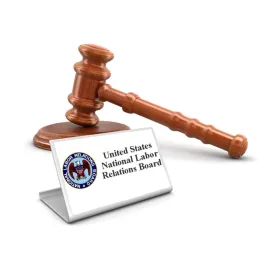Few governmental agencies can require private employers to permit their employees to say things on the job, in the presence of customers and co-workers, that employers don’t like. But the National Labor Relations Board can.
Most employers associate the National Labor Relations Board (the "NLRB" or "Board"), if they think about it at all, with labor unions. That's understandable, as one of the Board's primary missions is to facilitate "collective bargaining" by and between employers and unions.
But the Board deals with more than issues presented by labor unions. It is just as concerned with – and regularly enforces – employees' rights to "engage in … concerted activities for the purpose of" almost any kind of "mutual aid or protection" with respect to terms and conditions of employment. Such activities are generally known as "protected concerted activity" ("PCA"), which can arise regardless of whether a union is involved. What does and doesn’t amount to PCA, according to the Board anyway, isn’t always clear. A company as large and sophisticated as Home Depot found that out, quite publicly, late last month.
The Board, on February 21, 2024, issued a decision in Home Depot USA, Inc. v. Morales, in which it held that Home Depot violated the National Labor Relations Act (the “Act” or “NLRA”) by "constructively" firing an employee – Mr. Antonio Morales – because he refused to remove from his company-issued (and required) work apron the hand-drawn initials “BLM”. They were not the initials of Mr. Morales' name; they were intended, rather, to indicate that “Black Lives Matter”, which he wanted to declare in the workplace for all to see. The Board found that his insistence on doing so amounted to PCA and was thus protected by law – specifically by "Section 7" of the Act – because of the factual context in which his statement was made.
How This Case Made Its Way to the NLRB
The context is this: Mr. Morales worked as a Sales Specialist in the flooring department of one of Home Depot’s stores in Minnesota from August 2020 until February 2021. He was required to wear a work apron, provided by Home Depot, when on duty.
His employment with Home Depot was not optimal. From the start of it, another employee in the same department, Ms. Allison Gumm, subjected both customers and employees of color, including Mr. Morales, to racially discriminatory behavior. Mr. Morales and other employees discussed Ms. Gumm’s discriminatory conduct on several occasions and complained about it to multiple supervisors and managers. The complaints were not very effective. Ms. Gumm was disciplined in various ways but remained employed.
In February 2021, several employees prepared materials to post and share at the store (e.g., posters of Black historical figures and flashcards) for the observance of Black History Month. The materials, however, were repeatedly vandalized. As a result, managerial employees told their subordinates that “intolerance and disrespect will not be tolerated.” But no further action was taken.
In response, Mr. Morales sent an email to Enrique Ellis, an Assistant Store Manager, emphasizing to management that a “storewide conversation” about race discrimination was necessary so “people of color [would] feel safe at the store.” He, apparently, as a result, was called to meetings with management to discuss the handling of the vandalism and racial discrimination at the store. The conversations turned to the “BLM” initials that Mr. Morales had displayed on his company-mandated work apron during the last six months. Managerial employees told Mr. Morales that the display violated the company’s dress code and apron policy, which banned “displaying [on an apron] religious beliefs, causes or political messages unrelated to workplace matters.” They told him that he could not return to work until the display had been removed. Mr. Morales refused to remove it and explained that the display was his way to “show support” for employees of color, given the continued racial discrimination at the store (including the vandalism of the Black History Month materials). The company refused to permit him to work unless he relented. He didn’t, and eventually resigned.
The Handwritten "BLM" on the Work Uniform is Protected by the NLRA
The matter didn’t end there. Mr. Morales filed an "unfair labor practice" charge with the NLRB, claiming that the company had unlawfully interfered with his Section 7 right to engage in PCA by refusing to permit him to say what he wanted to say – in this case that "Black Lives Matter" – in writing on apparel that he was required to wear on the job. The Board agreed with him and found that Mr. Morales’ refusal to remove the “BLM” display from his apron was protected by the Act and that the company had unlawfully applied its dress code and apron policy in a way that interfered with his Section 7 rights. The NLRB found that Mr. Morales’s refusal to remove “BLM” from his apron amounted to protected concerted activity because it promoted the actions of other employees who had protested racially discriminatory working conditions and was intended to draw attention to them and to how Home Depot was dealing with them. The Board ordered Home Depot to stop its unfair labor practices, offer Mr. Morales full reinstatement to his former job (or a substantially equivalent position), and pay Mr. Morales in the form of backpay and money needed to protect him from the adverse tax consequences of receiving a lump-sum backpay award. (Home Depot may appeal the Board's decision to a federal court of appeals but is stuck with it for now.)
What Does This Mean for Employers?
There are many contexts in which private employers may lawfully tell employees what to say, and not to say, in the workplace. Employers, for example, may (typically) properly prohibit employees from using obscene language and from making disruptive statements of a political or religious nature when at work. But the Home Depot case reminds private employers that there are limits on what they may lawfully do – and they may not, it now appears, prohibit employees from making public statements about terms and conditions of employment to which employers object, even in the form of written words and phrases on company-provided apparel. Employers would be wise to think about that when considering the content and enforcement of "dress code" and related personnel policies.





 />i
/>i

